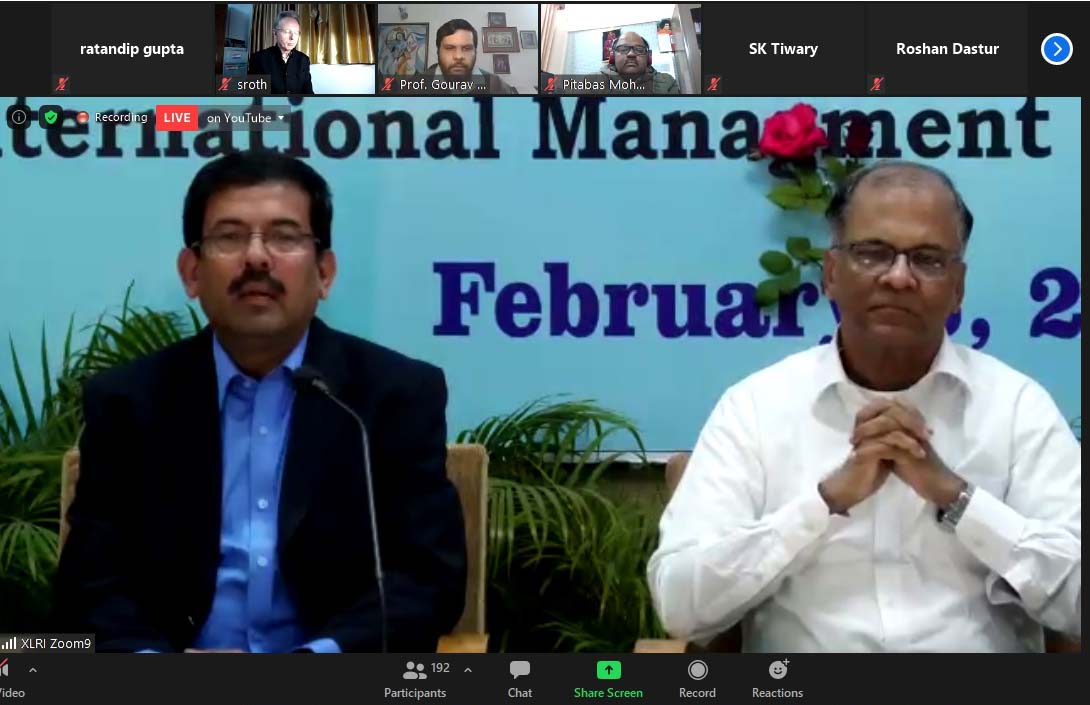XLRI holds 28th Annual JRD Tata Oration on Business Ethics
Jamshedpur: XLRI- Xavier School of Management, one of India’s premier B-Schools, hosted the 28th Annual JRD Tata Oration on Business Ethics on virtual mode.
This year, Fr. Stephan Rothlin, S.J., Ph.D., Director of the Macau Ricci Institute, and CEO of Rothlin International Management Consulting Ltd delivered the oration. Fr Rothlin gave his speech on ‘China The Emerging Superpower: The Ethical Underpinnings.’
Fr. Stephan Rothlin’s oration speech emphasized on the ethical perspectives and explained the key elements of business ethics, which he has been teaching in business schools in Beijing, Hong Kong, Macau, Singapore, and Taiwan for the last 23 years that will allow business leaders and entrepreneurs to understand and embrace the challenge of moral leadership in business. He shared his insights about business ethics in China, like the increasing importance of the local Confusion culture and its values. Case studies should be used as the most effective pedagogy for business ethics. Business schools should combine both the wisdom and traditions of India and China to cultivate moral virtues. Talking about China’s dramatic economic transformation, he referred to the data from the 2019 & 2020 OECD economic survey and shared some outstanding figures vis-à-vis the growth of China. The growth has slowed in the first half of 2020 but remains strong. China has managed to control Covid-19 pandemic and will remain the major driver of global growth, as is reflected by China’s significantly high GDP growth.
In his oration, he said, “China witnessed enormous trade frictions, which hurt not only both sides but also the global economy. As per the figures of the OCED, when we have 25 % of tariffs on goods worth USD 50 billion is another key factor, the impact of this trade frictions shaving off ¼ per cent of Chinese and US GDP and reduce world trade by 0.4% by 2020. Import volumes in both the countries decline by ¾ per cent, and in the US, CPI inflation rise by 0.2 ppt in both 2019 and 2020 as a result of higher import prices due to tariffs. Other countries are negatively affected through declining trade growth, through in the longer term, benefit from an improved competitive position in the US market. The saving rate remains very high, even though it has decreased over the past decade. China as an emerging superpower intends to be a major player in taking responsibility for the environment”.
He observed,” China has made impressive gains claiming to have lifted 700 million people out of poverty in 40 years since the open door policy. China should be given credit for the alleviation of mass poverty and handling the COVID-19 crisis very well after initial failures. If China manages to opt for a more sustainable economic growth, it would significantly impact the world economy”.
He pointed out, “I consider social business as a bridge between business and academia. India has made much progress in this area for many years. Original research on Chinese moral philosophy and its contribution to the interreligious dialogue on business ethics must be very concrete. We have to further push for original research on case studies emerging from Chinese and Asian business experiences. The common complaint is that the case studies from the business schools are still too reliant on American and European case studies. We have to develop online resource distribution further”.
While presenting several case studies focusing on the importance of Business Ethics, Dr. Rothlin, in one of the case studies, weighs “Business ethics and the sciences” and referred to the lesson from Sanlu’s Melamine –Tainted milk crisis in China. Since science is reality-based, a business must be reality-based as well, and he said, “The Covid -19 crisis certainly pushed us to take sciences more seriously. Failure to observe the scientific specification associated with companies’ goods may result in serious harm not only to the customers of such products but also to the firm itself and its leadership. Sanlu’s tainted milk crisis has a devastating effect until now, and the Chinese are very skeptical about consuming their own products. So if everyone cheats, then there is no advantage to be gained by cheating. Just as lying destroys trust in personal relationships, so fraud destroys trust in businesses”.
In his welcome address, Fr. P. Christie, S. J. Director of XLRI said, “Globalization has further enhanced the importance of ethical, moral compass in business. Globalization means that business strategy and business ethics cannot be separated from each other. Corporations have entered a new era, the “prove-to-me” era. Unethical practices and organizations are not being shrugged off anymore. Even reputed organizations and some outstanding CEOs are named, shamed and fined, or imprisoned for their ethical lapses the world over. The culture of an organization is established by the tone set at the top. Chief executives must lead by example.”
“XLRI has always emphasized the importance of adopting an ethical code of conduct within the corporate world. We believe that no management education curriculum is entirely complete unless and until the students are instilled with a set of values that are necessary decision-making ingredients for the corporate manager today. In 1991, XLRI, in association with a few select Tata Group Companies, established the XLRI-JRD Tata Foundation for Business Ethics to mark their long-standing commitment and contribution to business ethics in India. The Foundation seeks to address itself by publicly affirming the imperative need for adopting ethics in business and striving to shape an enabling eco-system to foster ethical business practices. Mr. JRD Tata, himself a role model extraordinary, set the bar high for the successive Ethics orations for over two decades as the first orator. We are delighted to have Fr. (Dr.) Stephan Rothlin, S.J. to deliver the 28th ‘Annual JRD Tata Oration on Business Ethics’ this year,” Fr. Christie further said in his address.

